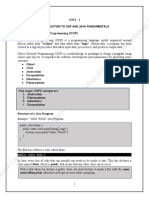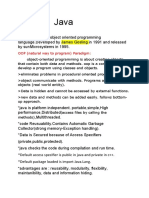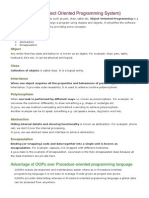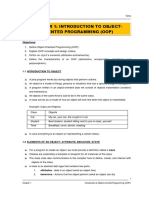0% found this document useful (0 votes)
16 views8 pagesOOP Concepts Java NetBeans
The document provides an overview of Object-Oriented Programming (OOP) concepts in Java, including classes, objects, encapsulation, inheritance, polymorphism, and abstraction, with examples using Java NetBeans. It highlights the benefits of OOP such as code reusability, modularity, scalability, maintainability, and better collaboration. Each concept is illustrated with code snippets to demonstrate practical implementation.
Uploaded by
Rainanz SocuanoCopyright
© © All Rights Reserved
We take content rights seriously. If you suspect this is your content, claim it here.
Available Formats
Download as PPTX, PDF, TXT or read online on Scribd
0% found this document useful (0 votes)
16 views8 pagesOOP Concepts Java NetBeans
The document provides an overview of Object-Oriented Programming (OOP) concepts in Java, including classes, objects, encapsulation, inheritance, polymorphism, and abstraction, with examples using Java NetBeans. It highlights the benefits of OOP such as code reusability, modularity, scalability, maintainability, and better collaboration. Each concept is illustrated with code snippets to demonstrate practical implementation.
Uploaded by
Rainanz SocuanoCopyright
© © All Rights Reserved
We take content rights seriously. If you suspect this is your content, claim it here.
Available Formats
Download as PPTX, PDF, TXT or read online on Scribd
/ 8























































































